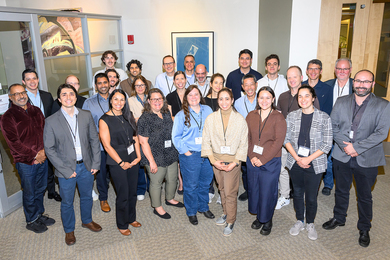The Faculty Policy Committee (FPC) has made three recommendations for changes in how MIT handles complaints. The recommendations, presented at the February 15 faculty meeting, were made in response to the report of the Ad Hoc Committee on Closing of the Center for Materials Research in Archaeology and Ethnology (CMRAE) and the faculty motion asking the FPC to "reassess the Institute's grievance procedures and report back to the faculty its conclusion about whether they need revision."
Professor Robert L. Jaffe, chair of the faculty, who presented the FPC's report, said the recommendations were to:
Encourage the president and the provost, when contemplating closing or reorganizing a department or other academic unit "to seek the guidance and advice of the Committee on Faculty Administration on ways to involve affected faculty, students and staff in the decision."
Amend Policies and Procedures to require the provost to issue a report to the Faculty Policy Committee following the closing or substantial reorganization of an interdisciplinary laboratory or center. The mechanism, Professor Jaffe said, "closely parallels the process already found in Policies and Procedures for closing or reorganization of academic units such as schools and departments."
Take into account the recommendations to be made by a committee exploring ways to strengthen resources available to faculty and administrators for investigating difficult cases of harassment. That committee is headed by Henry D. Jacoby, the William F. Pounds Professor of Management, a former chair of the faculty.
In other matters at the meeting, Dean Arthur C. Smith of the Office of Undergraduate Education and Student Affairs and Professor Triantaphyllos R. Akylas, chair of the Committee on Discipline, reported on disciplinary cases heard in the past year. The purpose of the annual report is "to inform the faculty about the number and disposition of discipline cases," they said. The Dean's Office handled 35 cases in fiscal year 1993-94. Incidents included assault, religious harassment, property misuse, drug use, underage drinking and homophobic graffiti. The Committee on Discipline handled 12 cases during the same period. Incidents included burglary, sexual harassment, altering or cheating on an exam, altering a grade report and plagiarizing a thesis. Dispositions included expulsion, withholding a degree for a period of years, revoking a degree, suspension and probation for varying periods.
A report on harassment was given by Samuel J. Keyser, the Peter de Florez Professor of Linguistics, who has compiled data from a yearly survey of 2,700 faculty and staff for the last four years. Reports of incidents have declined from 152 in 1991 to 87 in 1994, he said. Professor Keyser also summarized statistics compiled by the Institute's two ombudspersons, Mary P. Rowe and Clarence G. Williams, who keep records on the number and nature of their contacts.
A version of this article appeared in MIT Tech Talk on March 1, 1995.





